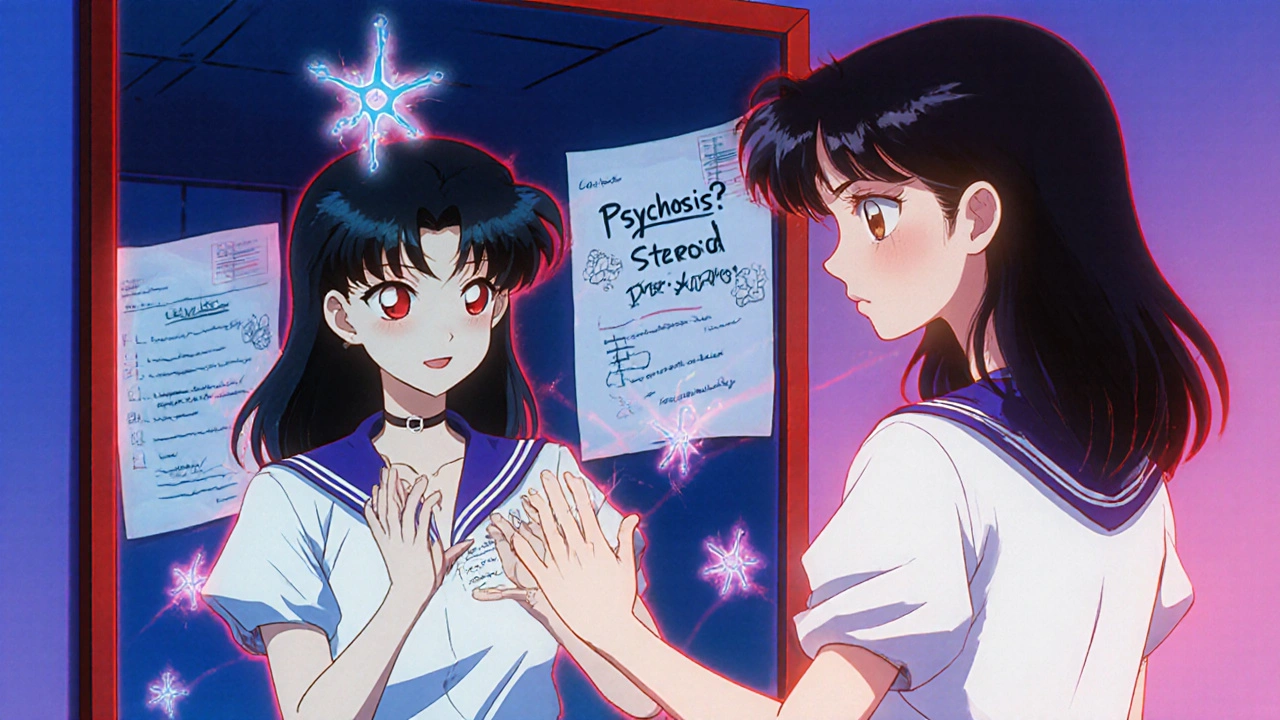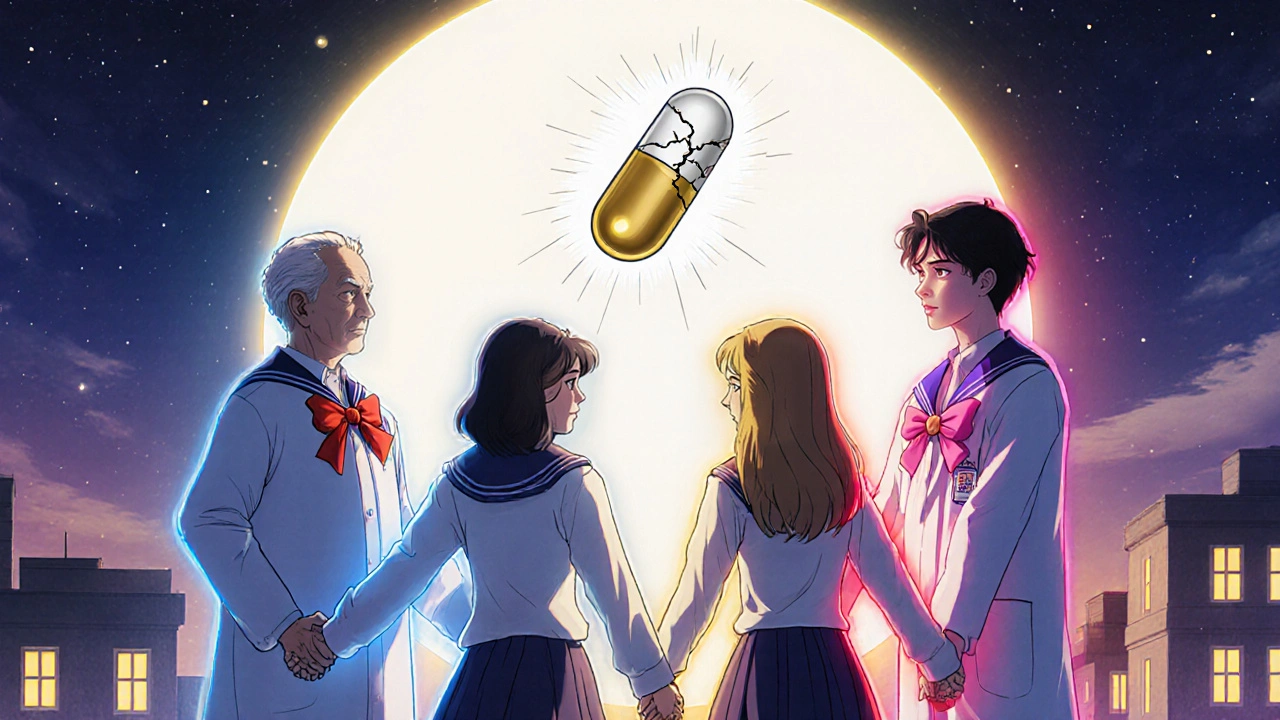Mood and Behavioral Changes from Corticosteroids: What You Need to Know About Psychosis Risk
 Nov, 24 2025
Nov, 24 2025
Corticosteroid Psychosis Risk Calculator
Your Estimated Risk
Important: This tool estimates risk based on published data. Never stop steroids abruptly. Always consult your doctor for medical advice.
When you’re prescribed corticosteroids for asthma, rheumatoid arthritis, or a flare-up of an autoimmune condition, the goal is clear: reduce inflammation, calm the immune system, and get you back on your feet. But what if the very drug helping your body starts messing with your mind? It sounds unlikely - until it happens. People on high-dose steroids report sudden mood swings, insomnia, rage, euphoria, or worse - hallucinations and delusions. This isn’t rare. It’s underreported, misunderstood, and often mistaken for something else entirely.
It’s Not Just Anxiety - It’s Steroid-Induced Psychosis
Psychosis from corticosteroids isn’t a myth. It’s a real, documented medical condition. The DSM-5 defines it clearly: psychotic symptoms - like hearing voices, believing things that aren’t true, or acting in ways that don’t make sense - that appear during or shortly after steroid use and can’t be explained by another illness. These aren’t just "feeling stressed." These are full-blown breaks from reality. The numbers don’t lie. At doses below 40 mg of prednisone per day, about 1.3% of people develop psychiatric symptoms. At 80 mg or higher? That jumps to nearly 1 in 5. And since doctors in the U.S. write over 10 million new steroid prescriptions every year, we’re talking about tens of thousands of people each year who could be at risk.When Do Symptoms Show Up - And What Do They Look Like?
Symptoms don’t wait months to appear. Most show up within the first week. The median? Just three to four days after starting the medication. That’s why so many people blame their irritability on a bad night’s sleep, or their paranoia on work stress. But if you’ve just started steroids and suddenly feel like everyone’s watching you, or you’re convinced you’ve been replaced by someone else - that’s not normal. The spectrum is wide:- Euphoria (27.5% of cases) - feeling unrealistically happy or invincible
- Insomnia (42.3%) - unable to sleep even when exhausted
- Mood swings (38.7%) - going from calm to furious in minutes
- Personality changes (29.1%) - becoming withdrawn, aggressive, or detached
- Severe depression (14.6%) - hopelessness, thoughts of self-harm
- Frank psychosis (5-18%) - hallucinations, delusions, disorganized speech
Who’s Most at Risk?
Not everyone on steroids will have these side effects. But some people are far more vulnerable:- Women - multiple studies show higher susceptibility
- People over 65 - aging brains react differently to steroid exposure
- Those with a history of bipolar disorder or depression - steroids can trigger a relapse
- Anyone on high doses for more than a few weeks - duration matters as much as dose
Why Does This Happen?
We don’t have all the answers - but we know enough to be alarmed. Corticosteroids cross the blood-brain barrier and directly affect brain chemistry. They suppress the HPA axis - the system that normally regulates stress and cortisol. That disruption throws off the balance of neurotransmitters. Animal studies show steroids spike dopamine levels - the same chemical that goes haywire in schizophrenia. They also damage the hippocampus, the brain’s memory center. That’s why many patients report trouble remembering things, even simple conversations. Memory loss isn’t just "getting old" - it’s a direct effect. And here’s the kicker: symptoms don’t always vanish when you stop the drug. Case reports show psychosis and mania lingering for weeks or even months after discontinuation. That means recovery isn’t guaranteed just because you’ve tapered off. The brain doesn’t reset overnight.
What Should You Do If You Notice Changes?
If you or someone you care about is on steroids and starts acting strangely - don’t ignore it. Early signs to watch for:- Confusion or trouble following conversations
- Unusual agitation or restlessness
- Sudden changes in sleep patterns
- Uncharacteristic anger or paranoia
- Statements that don’t make sense - "I’m being watched," "My thoughts aren’t mine"
How Is It Treated?
There’s no FDA-approved drug specifically for steroid-induced psychosis. That’s a huge gap. But we have tools that work. The first step? Reduce the dose. If possible, taper below 40 mg of prednisone per day. Studies show 92% of patients improve significantly with this alone. If you can’t lower the dose - because your condition demands it - then antipsychotics are the next line. Low-dose haloperidol, risperidone, or olanzapine have helped many patients recover within days. These aren’t perfect - they have side effects - but they’re often the only thing standing between a patient and a psychiatric hospital. Lithium has been used to prevent mania in high-risk patients, but it’s risky itself. It needs blood tests, careful monitoring, and a psychiatrist’s oversight. Not something to try without expert guidance.Who Should Be Involved in Your Care?
This isn’t just your primary care doctor’s problem. It’s a team effort. You need:- Your prescribing specialist (rheumatologist, pulmonologist, etc.)
- Your pharmacist - they’re often the first to notice behavioral changes
- A psychiatrist - for diagnosis and medication management
- Your family - they’ll see changes before you do

The Bigger Problem: We’re Not Looking Hard Enough
Despite decades of research since the 1950s, we still lack standardized tools to detect these changes early. No screening questionnaire is routinely used. No blood test predicts who’ll go psychotic. No clear protocol exists across specialties. Clinicians know it happens. But they don’t know how often - or how to catch it fast. That’s why so many cases are labeled "delirium," "dementia," or "drug abuse." The real cause? Steroids. The pharmaceutical industry hasn’t invested in solutions. No new drugs. No warning labels strong enough. Just a quiet footnote in the prescribing information.What You Can Do Right Now
If you’re on corticosteroids:- Ask your doctor: "What are the mental side effects I should watch for?"
- Ask your pharmacist: "Can you check in with me weekly about how I’m feeling?"
- Ask a family member to help monitor your mood and sleep
- Keep a simple journal: note sleep, mood, energy, and any strange thoughts
- If you feel off - don’t wait. Call your doctor the same day
- Don’t dismiss mood swings as "just being grumpy"
- Take sudden behavioral changes seriously - even if the person says they’re fine
- Keep a list of all medications, including doses and start dates
- Bring that list to every appointment
Final Thought: This Isn’t Weakness - It’s Biology
People who develop psychosis on steroids aren’t "crazy" or "overreacting." They’re victims of a powerful drug that alters brain chemistry in ways we still don’t fully understand. The risk is real. The consequences can be devastating. But it’s preventable - if we pay attention. The next time someone on steroids seems "off," don’t shrug it off. Ask. Listen. Act. Because sometimes, the medicine that saves your body can break your mind - and no one will notice unless you do.Can corticosteroids cause psychosis even at low doses?
Yes, though it’s rare. Psychosis is most common at doses above 40 mg of prednisone per day, but cases have been reported at lower doses, especially in older adults or those with prior psychiatric conditions. Even 20 mg daily can trigger mood swings or insomnia in sensitive individuals.
How long do steroid-induced psychiatric symptoms last?
Most symptoms improve within days to weeks after reducing the dose or stopping the drug. But in some cases - especially with psychosis or mania - symptoms can persist for weeks or months after discontinuation. This is why ongoing monitoring is critical, even after the steroid course ends.
Are women more likely to get steroid psychosis than men?
Yes. Multiple studies show women are at higher risk, possibly due to hormonal differences in how steroids interact with brain receptors. The exact reason isn’t clear, but the pattern is consistent across clinical data.
Can I stop my steroids if I’m having mood changes?
Never stop abruptly. Suddenly stopping steroids can cause adrenal crisis, which is life-threatening. Always talk to your doctor first. They may recommend tapering the dose slowly while managing psychiatric symptoms with medication or therapy.
Is there a test to predict who will get steroid psychosis?
No. There are no blood tests, genetic markers, or scans that can reliably predict who will develop these side effects. Diagnosis is based on timing, symptoms, and ruling out other causes. That’s why awareness and early reporting are so important.
Do all corticosteroids carry the same risk?
Not exactly. Prednisone is the most studied, but dexamethasone - often used in cancer or brain swelling - has a higher potency and may carry greater psychiatric risk at lower doses. Inhaled or topical steroids rarely cause these effects because they don’t enter the bloodstream in significant amounts.
Can steroid-induced psychosis be confused with schizophrenia?
Yes, and that’s a common mistake. Steroid psychosis often mimics schizophrenia - hallucinations, delusions, disorganized thinking. But the key difference is timing: symptoms appear shortly after starting steroids and improve when steroids are reduced. Schizophrenia typically begins in early adulthood and doesn’t respond to steroid tapering.
What should I do if my doctor dismisses my symptoms?
Get a second opinion. Ask to speak with a psychiatrist or a liaison mental health specialist. Bring printed information about steroid-induced psychosis - many doctors aren’t trained to recognize it. Your symptoms are real, and you deserve to be heard.

katia dagenais
November 25, 2025 AT 04:38Okay but have you ever considered that maybe our entire medical system is just a pyramid scheme built on pharmaceutical placebo pills and doctor ego? Steroids are just the latest villain in a 70-year saga of synthetic solutions creating more problems than they solve. We treat symptoms like they’re separate from the body, like your brain’s just a disconnected wifi router that needs a reboot. But it’s not. It’s all connected. And we’re just poking it with sticks and calling it medicine.
Josh Gonzales
November 26, 2025 AT 05:42Been on prednisone for 3 weeks for my lupus flare. Started getting weirdly euphoric around day 5 then crashed into pure rage by day 7. Thought I was losing it. Called my rheum doc and he said ‘oh yeah that’s normal’ and handed me a pamphlet. No follow up. No screening. Just… okay then. This needs to be standard protocol. Not a footnote.
Jack Riley
November 26, 2025 AT 21:08So let me get this straight - we flood the body with cortisol analogs to suppress inflammation, but the same molecules that calm your joints also hijack your dopamine pathways and turn your mind into a glitchy horror movie? And we’re surprised when people start believing their toaster is whispering to them? The real tragedy isn’t the psychosis - it’s that we’ve normalized this as collateral damage. We’ve turned human beings into acceptable loss metrics on a clinical trial spreadsheet. We don’t treat patients. We optimize outcomes. And if your brain melts? Well… that’s just biology being inconvenient.
Jacqueline Aslet
November 28, 2025 AT 11:52It is of paramount importance to acknowledge the profound epistemological limitations inherent in contemporary pharmacological paradigms. The ontological dissonance between somatic intervention and neurochemical consequence remains glaringly under-addressed within the medical literature. One must therefore posit that the current paradigm of corticosteroid administration constitutes a form of biochemical imperialism - wherein the psyche is subjugated as collateral in the service of physiological homeostasis. A re-evaluation of ethical frameworks is not merely advisable - it is imperative.
Caroline Marchetta
November 29, 2025 AT 00:38Oh honey. You mean the same drugs that turn your aunt into a screaming maniac who thinks her cat is the Queen of England? Yeah, that’s ‘normal’ according to Big Pharma’s tiny footnote in the 12-point font. Meanwhile, my mom spent three weeks in psych after her arthritis flare-up, and no one even asked if she’d been on steroids. Just diagnosed her with ‘late-onset schizophrenia’ and gave her Haldol. Thanks, medicine. You’re a lifesaver.
Valérie Siébert
November 29, 2025 AT 23:14GUYS. I was on 60mg prednisone for my Crohn’s and I thought I was having a spiritual awakening. I was writing poems to my blender, convinced I was channeling Nikola Tesla. My husband called my doctor and they were like ‘ohhh yeah that’s a thing’ and tapered me. I’m fine now. But if you’re on steroids and you start feeling like you’re the chosen one - DON’T IGNORE IT. It’s not enlightenment. It’s neurochemistry gone rogue.
Andrew McAfee
November 30, 2025 AT 19:32Back home in Texas we call this ‘steroid rage’ and we just tell folks to drink more water and pray. But yeah I’ve seen it. Cousin took steroids after knee surgery and started yelling at the TV like it was a conspiracy feed. Didn’t know it was the meds till his wife brought the bottle to the ER. Doc just shrugged. We gotta do better than shrugs.
Erika Hunt
December 1, 2025 AT 12:38I just want to say - thank you for writing this. I’ve been trying to tell my rheumatologist for months that I’ve been having these terrifying episodes where I feel like I’m floating outside my body, and he keeps saying it’s ‘stress-related insomnia.’ I finally printed out this article and handed it to him. He paused. Then said, ‘Huh. I didn’t know that was documented.’ I cried. Not because I was relieved - because I realized how little they actually know. We’re not just patients. We’re data points with feelings.
prasad gaude
December 1, 2025 AT 19:09In India, we say: ‘The body remembers what the mind forgets.’ Steroids are like a lightning strike to the nervous system - sudden, powerful, and unpredictable. I saw a neighbor take them after a transplant and he became a different person - smiling one minute, screaming at shadows the next. His family thought he was cursed. No one knew it was the medicine. We need to talk more - not just in hospitals, but in homes, in temples, in chai stalls. This is not rare. It is silent.
Srikanth BH
December 1, 2025 AT 22:55You’re not alone. I was on high-dose steroids after a bad infection and I didn’t realize I was being paranoid until my daughter asked me why I was hiding the TV remote ‘so they couldn’t track me.’ I thought she was joking. Turns out I was whispering to the walls. I got help, tapered slowly, and now I’m okay. But I wish someone had warned me. Don’t wait until you’re screaming at your toaster. Speak up. Even if it feels silly. It’s not.
Jennifer Griffith
December 3, 2025 AT 06:19so like… i was on steroids for my eczema and i started thinking my dog was plotting to kill me. i thought i was going crazy. turns out i was. just… chemically. my dr was like ‘lol yeah that happens’ and gave me a zoloft. i feel like i should’ve gotten a medal for surviving my own brain.
Kimberley Chronicle
December 4, 2025 AT 11:10As a pharmacist, I see this every month. Patients come in saying ‘I’m not sleeping, I’m crying for no reason, I think my neighbors are spying on me.’ We flag it, call the prescriber, and 90% of the time, they’re like ‘Oh right, I forgot to mention the psychiatric risks.’ We need mandatory screening checklists. Not optional. Not ‘if you think of it.’ Mandatory. It’s not asking too much to ask if someone’s hearing voices before you give them a 120mg dose.